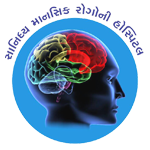

Sanidhya Psychiatric & Physiotherapy Center
02742 257666
Autism Spectrum Disorder
Definition
Autism spectrum disorder (ASD) is the name for a group of developmental disorders. ASD includes a wide range, “a spectrum,” of symptoms, skills, and levels of disability.
People with ASD often have these characteristics:
•Ongoing social problems that include difficulty communicating and interacting with others
•Repetitive behaviors as well as limited interests or activities
•Symptoms that typically are recognized in the first two years of life
•Symptoms that hurt the individual’s ability to function socially, at school or work, or other areas of life
Some people are mildly impaired by their symptoms, while others are severely disabled.
Signs and Symptoms
Parents or doctors may first identify ASD behaviors in infants and toddlers. School staff may recognize these behaviors in older children. Not all people with ASD will show all of these behaviors, but most will show several. There are two main types of behaviors: “restricted / repetitive behaviors” and “social communication / interaction behaviors.”
Restrictive / repetitive behaviors may include:
•Repeating certain behaviors or having unusual behaviors
•Having overly focused interests, such as with moving objects or parts of objects
•Having a lasting, intense interest in certain topics, such as numbers, details, or facts.
Social communication / interaction behaviors may include:
•Getting upset by a slight change in a routine or being placed in a new or overly stimulating setting
•Making little or inconsistent eye contact
•Having a tendency to look at and listen to other people less often
•Rarely sharing enjoyment of objects or activities by pointing or showing things to others
•Responding in an unusual way when others show anger, distress, or affection
•Failing to, or being slow to, respond to someone calling their name or other verbal attempts to gain attention
•Having difficulties with the back and forth of conversations
•Often talking at length about a favorite subject without noticing that others are not interested or without giving others a chance to respond
•Repeating words or phrases that they hear, a behavior called echolalia
•Using words that seem odd, out of place, or have a special meaning known only to those familiar with that person’s way of communicating
•Having facial expressions, movements, and gestures that do not match what is being said
•Having an unusual tone of voice that may sound sing-song or flat and robot-like
•Having trouble understanding another person’s point of view or being unable to predict or understand other people’s actions.
People with ASD may have other difficulties, such as being very sensitive to light, noise, clothing, or temperature. They may also experience sleep problems, digestion problems, and irritability.
ASD is unique in that it is common for people with ASD to have many strengths and abilities in addition to challenges.
Strengths and abilities may include:
•Having above-average intelligence – the CDC reports 46% of ASD children have above average intelligence
•Being able to learn things in detail and remember information for long periods of time
•Being strong visual and auditory learners
•Excelling in math, science, music, or art.
sanidhyapsychiatrichospital@yahoo.com
Mon to Sat
Mor 10.00 A.M to 4.00 P.M
Ev 5.30 P.M to 8.00 P.M
Sai Complex,2nd Floor,
Opp Prakash Super Market, Gobri Road, Sanskar Society,
Palanpur, Gujarat 385001
Copyright © Dr.Nishant Saini (Sanidhya Hospital,Palanpur). All rights reserved.
Designed & Developed By : pCube Software Solution,Palanpur